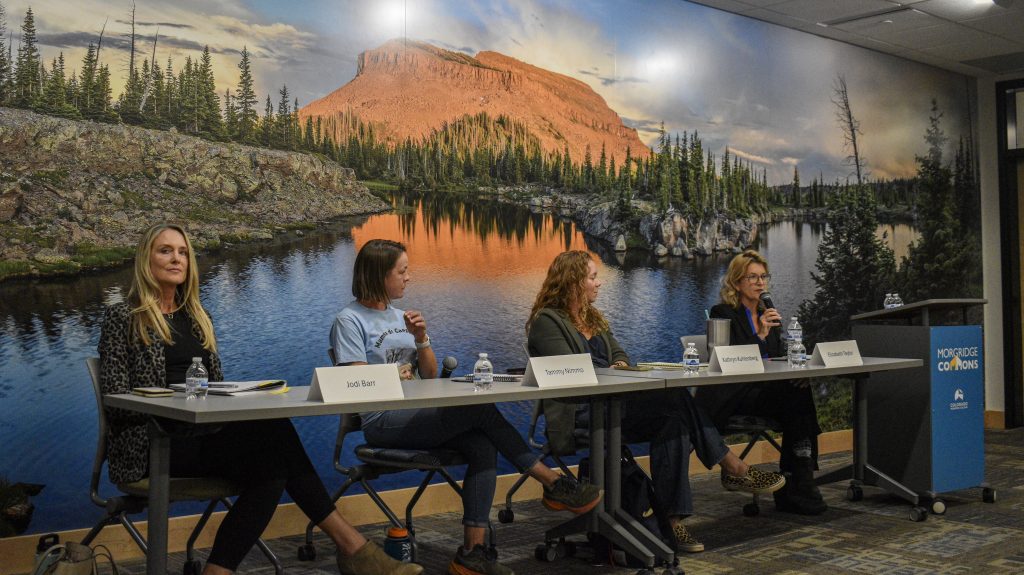Roaring Fork School Board candidates debate in Glenwood Springs

Jaymin Kanzer/Post Independent
The four Roaring Fork School District Board of Education candidates took part in their third forum on Thursday night in the build up to the upcoming Nov. 4 election.
The Fall 2025 Issues and Answers was held on Thursday night at the Morgridge Commons in Glenwood Springs, starting with an hour-long panel with the four candidates running for the two open RFSD board seats.
Candidates Jodi Barr and Tamara Nimmo are running for the open District A seat while incumbent Kathryn Kuhlenberg is seeking re-election in District E — contested by Elizabeth Taylor. An interactive map of the district boundaries are available at rfschools.com. Voters can vote for candidates in all districts for school board regardless of which district the voter lives in.
The event was hosted by the Glenwood Springs Chamber Resort Association and CoWest Noticias Collaborative and moderated by Glenwood Springs Post Independent Publisher Peter Baumann and Sopris Sun Editor Raleigh Burleigh.
Topics ranged from safety, the achievement gap and student equity, data-driven approaches, fundraising possibilities, declining enrollment, and being able to address what the current board could have done better. Candidates were also offered the chance to directly ask their opponent a question.
In District A, Barr — a small business owner — said she is running on the priorities of building more trust within the community and student wellness. Nimmo is a longtime substitute and PTA leader at Crystal River Elementary School. She said is running out of passion for the school district.
Kuhlenberg said she is seeking re-election in District E and looking to build off the groundwork she laid during her first term, emphasizing the need to address declining enrollment and the necessity to retain quality teachers. Taylor, who has experience teaching outdoor education on the East Coast, used the opening statement to point out the desire for transparency in the budget, and curricula, while also hoping to improve test scores.
The first question delved into the topic of safety. Kuhlenberg and Nimmo both agreed in feeling safe in schools, while also being willing to adopt further measures if necessary.
“It’s a ‘Yes, and’ question,” Kuhlenberg said. “I believe our schools are currently safe, but there is always room for growth.”
“I’ve been subbing in our schools for over nine years, and I’ve never encountered anything that I would consider dangerous,” Nimmo said. “It’s important to me that we don’t convince our kids that they are in a dangerous place, when I believe we are very lucky to live in a safe community.”
Barr, who has consistently reaffirmed her stance on wanting to arm willing teachers in the school district since bringing it up in the Oct. 2 forum, said the district needed to look for further security measures, while Taylor agreed.
“I honestly feel like, if you can’t have a school resource officer, at least one per campus which we know isn’t affordable, then are the kids really safe?” she asked.
Taylor agreed and said the board would have to be willing to look at everything.
“I think we just need to look at all the options on the table,” she said. “Be willing to look at everything and make sure it’s within our budget, that it’s feasible and practical, and people can agree on. I definitely think there should be consequences for kids who are causing problems in their schools. I think we have a lot in place, but I also think we need to make sure that we look at all options on the table.”
The topic then shifted to the data-driven approach RFSD has taken to address the achievement gap.
Taylor and Barr both wondered if the recently enacted data-driven approach was actually working.
“Yes, a data-driven approach makes sense, but is it working?” Barr asked. “Is what’s being taught working? That’s what I question, not the data-driven approach. I think we need to stop talking about the achievement gap and challenge kids that are high achievers and bring kids up to par that are low.”
Taylor agreed and pointed to individual and specific help to each and every learner as a way to close the gap.
“I think that we need to make sure that the kids who need extra help are getting it,” she said. “For instance, the English language learners getting early language skills, and getting kids with learning disabilities the help they need.”
Kuhlenberg looked at every school individually and wondered how to widely implement what was working in specific locations throughout the district, while pushing back against the implication that some students aren’t being pushed hard enough.
“The key is to figure out what’s working in those schools and replicate it in our other schools so that every child can have access to a high quality curriculum and high quality education,” she said. “We want to challenge our students, and we do. Two of my kids are in our PEAK program, and they are being pushed incredibly hard.”
Nimmo revealed her own experience in trying to feel comfortable in a new environment, and said that addressing the gap would be one of her main priorities.
“I came to America in second grade, and I still remember trying to figure out multiplication. It was terrifying for me because I didn’t recognize the culture that I was in,” she said. “It took me a long time to get comfortable in school, but that’s something that I’m going to be diving deep into as soon as I get on the board, trying to understand why it’s there and what we have to do to close it.”
The panel ended with every candidate given the chance to ask their opposition a question. To start, Nimmo asked Barr how she would continue to try to make change if she wasn’t to be elected.
“I have some ideas that I honestly don’t want to share,” Barr started. “I’m going to be in the know, I’m going to be paying attention to what’s going on in the school boards, and I’m going to continue to make sure that parents are heard. I’m a taxpayer, and I’m a grandparent, and I have a lot of friends in the community, so I have a lot of skin in this game.”
Barr held onto the mic and asked Nimmo about how she plans to keep the board from mismanaging funds, like when the board had to reallocate money from the staff housing project.
“The problem was we didn’t have systems in place to hold things together if certain people left,” Nimmo explained. “This happens all the time in business, things are going well but it’s because of the people that are there. So what they’ve done is put systems in place, so that no matter who is in charge, there will always be job descriptions and evaluations and accountability. I would just make sure that we still have the right people and systems in place, and try not to stay reliant on people just being good at what they do.”
Taylor stayed on the topic of the budget when asking Kuhlenberg how she will make sure the board stays “accountable to the stakeholders.”
“What we’ve done over the past few years is develop the systems that Tammy was just mentioning,” Kuhlenberg said. “The board wasn’t receiving quarterly financials, the board wasn’t receiving the audit in a timely way. The finance policies were 20-30 years outdated and didn’t include accountability provisions.
“The powers of the board are actually very limited and understanding specifically what the board is empowered to do is critical when addressing this problem. The board has done everything in its power to ensure that these systems are in place and that we are on the right path.”
Kuhlenberg used the opportunity to ask her opponent about her public X account, DOGEtheIdeology, formerly DOGEtheSchools.
“DOGE does not refer to slashing and burning the budget, it has to do with getting rid of waste, fraud, and abuse that I might find in the schools,” Taylor said. “I was referring to anything that is unnecessary in our curricula and any of the learning materials that are in there that I think are not helpful to our kids.
“I also want to address the policy of Diversity Equity Inclusion and Anti-Racism. I think we need to take a look at that and make sure that it is actually to the best interest of our students and the way our students are learning and their proficiency scores.”

Support Local Journalism

Support Local Journalism
Readers around Glenwood Springs and Garfield County make the Post Independent’s work possible. Your financial contribution supports our efforts to deliver quality, locally relevant journalism.
Now more than ever, your support is critical to help us keep our community informed about the evolving coronavirus pandemic and the impact it is having locally. Every contribution, however large or small, will make a difference.
Each donation will be used exclusively for the development and creation of increased news coverage.










